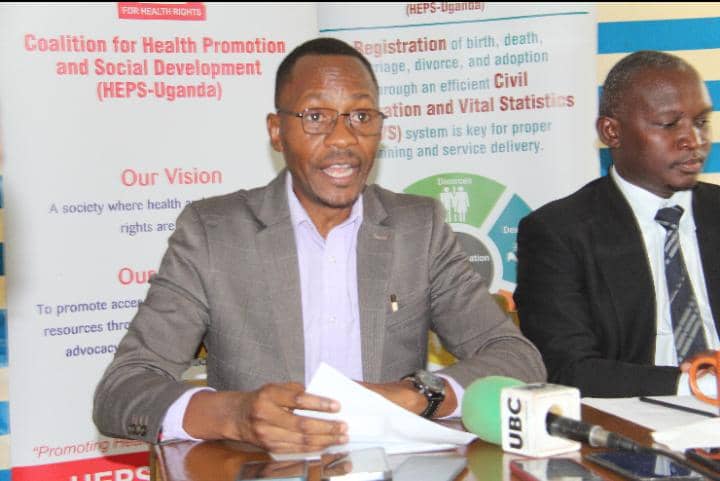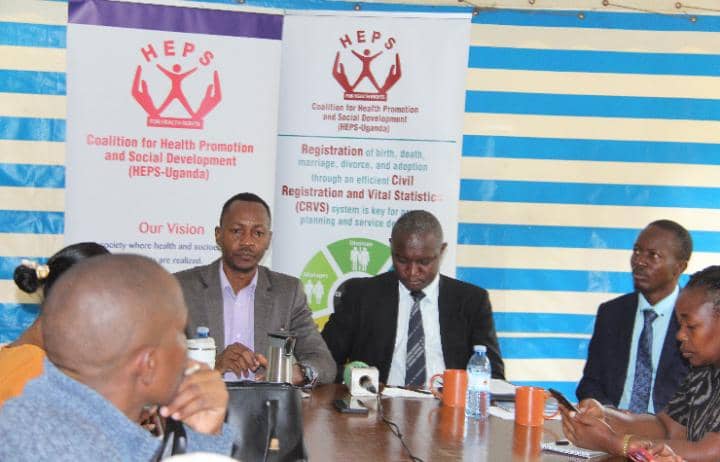By Julius Mugaga Tukacungurwa/Umoja Standard.
Kampala, Uganda: Today, Robert Ofiti, Regional Manager for HEPS-Uganda, emphasized the importance of civil registration and vital statistics (CRVS) in Uganda, highlighting the alarming fact that only 32% of children under the age of 5 have their birth registered. This staggering statistic leaves nearly 7 out of 10 children without legal recognition as Ugandans, restricting their access to essential services.

Robert Ofiti, Regional Manager for HEPS-Uganda Addressing Journalists at Headquarters in Kampala. Photo by Julius Mugaga Tukacungurwa.
“The impact of missed opportunities in civil registration is personal,” Ofiti shared, citing the story of Kate Namusoke, a 35-year-old mother of two who faced difficulties obtaining birth certificates for her children when they started school. Namusoke’s experience is not unique, as many parents and guardians only register their children’s births when absolutely necessary.
Birth registration is not just an administrative task; it is a crucial service that enables access to healthcare, education, travel, and social protection programs. Countries with high birth registration rates enjoy better social services, improved healthcare outcomes, and more effective public health policies.
“Every child deserves the chance to start life with legal recognition,” Ofiti stressed. “By registering births promptly, we make it easier, cheaper, and faster. Let us ensure that no Ugandan child is left unregistered.”
HEPS-Uganda and partners are calling on the government, civil society, and the media to prioritize birth registration and make it a nationwide priority. “By working together, Uganda can build a stronger CRVS system, empowering families, communities, and the nation as a whole.” He stated.
HEPS-Uganda believes that by amplifying this message, Uganda can build a brighter future for its citizens, where every life is counted, every death is recorded, and every citizen’s contribution to society is valued.
At the same press conference, Counsel Moses Talibita, Legal and Compliance Officer at Uganda National Health Consumer’s Organization, emphasized the importance of birth registration in Uganda, stressing that “birth registration is crucial for a child’s identity, parentage, and access to education, healthcare, and social services.” Despite being free and compulsory, only 32% of children under five are registered, leaving many without legal recognition and access to essential services.
Talibita highlighted the challenges faced by parents, noting that “costs involved, such as transport and queuing, hinder completion.” He also cited technicalities in the registration process, including lengthy forms and requirements, which can lead to errors and unnecessary costs.“The family that needs to complete this registration process has to prepare at home, get all the necessary information, and have all that documentation or fill in that form together,” Talibita explained.
To address these challenges, Talibita recommended streamlining the registration process and enhancing male involvement to ensure accuracy. “Male involvement is crucial to ensure that there are no errors,” he emphasized. He also advocated for decentralizing National Identification Registration Authority (NIRA) offices for easier access.
Talibita stressed that birth registration is a right of every child, citing Section 54 of the Registration of Persons Act, which compels Ugandans to register their children. “Parents should never abdicate from this duty,” he urged. “Birth registration is essential for a child’s future, as it enables them to access services such as education, healthcare, and banking services when they turn 18.”
He noted, by improving the birth registration process, Uganda can ensure every child’s right to recognition and access to essential services. “It is important that we support those who are going through this process, because in doing so, we are helping a child be recognized and access all those other services that are tagged on our national registration.”
According to World Health Organization, a well-functioning Civil Registration and Vital Statistics (CRVS) system registers all births and deaths, issues birth and death certificates, divorce, marriage and adoption and compiles and disseminates vital statistics, including cause of death information and in Uganda, the mandate of executing these services fall under National Identification and Registration Authority (NIRA).


